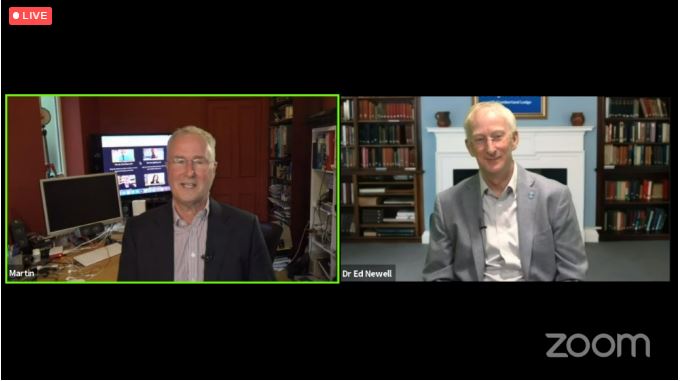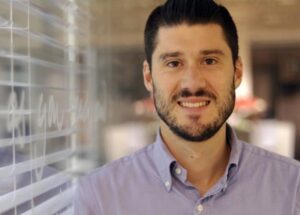On 28 April 2021, Cumberland Lodge Chief Executive, Ed Newell, shared an hour-long conversation with the broadcaster and news anchor Martin Stanford, about Martin’s career and life lessons. This tête-à-tête was part of the Cumberland Conversations series, which brings guest speakers from public life to the Lodge for an informal conversation on a quarterly basis.
During the pandemic, Cumberland Conversations have been live-streamed on the Cumberland Lodge website and Facebook page, and participants joining live on Zoom can send their questions via the online chat function.
This particular Conversation was filmed live from our green-screen studio, with Martin joining remotely from his home-studio. An audio recording of it is included below, and the full video recording is available here.
Starting out
Martin Stanford starts the Conversation by going back to his college years, when he first entered a BBC studio in Oxfordshire, at the age of 17. He describes in vivid detail the atmosphere of that setting, 30 years ago: the old microphones hanging from the ceiling, the silence of the recording room (the ‘dead acoustic’, as Martin calls it), and the special lights signalling to the broadcaster when the show is on air. This ambiance was captivating for young Martin, and this early encounter with the world of radio broadcasting was a life-changing moment.
Martin then recounts his journey in the sector. He explains how he rose from being an unpaid apprentice at a local BBC studio to being a presenter at BBC News and Sky News. Interestingly, he did not really consider a frontline broadcasting role when he began his career. He first trained as a sound engineer; and only a few years later learned the specific skills of radio presenting, before moving into TV broadcasting.
Breaking news
Asked by Ed to share a few insights on the biggest breaking news stories of his career, which has so far spanned three decades, Martin shares with passion the coverage of the death of Diana, Princess of Wales, in August 1997. He recalls his manager ringing him in the middle of the night to alert him about the car crash and prepare to cover the events as they unfolded that day.
As Martin relates, these were the days before Twitter and smartphones, so a TV presenter played a major role in reporting a story and making it accessible to the general public. He remembers the breathtaking tension on that day, as everyone was anxiously waiting to learn about the fate of the Princess of Wales.
By listening to Martin and the many incredible stories he was able to cover around the world, one can easily understand the passion that comes with presenting the news. It is no wonder that Martin finds the world of radio and TV broadcasting ‘exhilarating’, and that he decided to pursue a career in this sector.
Echo chambers and fake news
Towards the end of the conversation, Ed and Martin discuss the evolution of news broadcasting over the past 30 years. I was very interested to hear Martin’s analysis of digital technologies. I agree with Martin when he says that these have ‘changed the landscape’ of information, which is now a very ’different world’ from when Martin started out on his career.
For the past 15 years, access to information has been completely disrupted by the technology of the Internet and social networking platforms. Martin appreciates that the ‘speed of information and number of sources have multiplied, perhaps exponentially’. He also points at two major issues linked to the fact that access to information shared on social media is now quasi-instantaneous: the problem of ‘veracity’ and the ‘echo chamber’ effect. In other words, fake news and silo thinking are two downsides of modern social media communication.
Martin also confesses that in his experience as a broadcaster, ‘life was easier when there was fewer sources of information’.
I recommend this Conversation to anyone who is interested in the world of media, especially radio and TV broadcasting. Needless to say that having a professional public speaker as your guest for such a dialogue also makes it naturally very entertaining to listen to!


